|
While the rules of FRIEDRICH are quite simple, the basic situation of conflict and the the 18th century borderlines are not. Therefore, it is a good idea to take a close look at the gameboard first. |
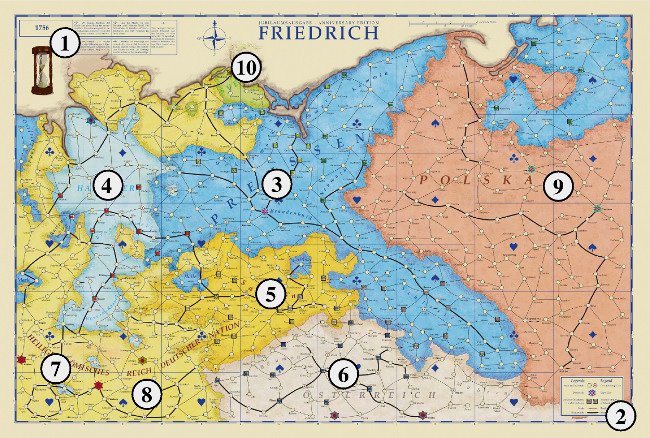
The Gameboard

|
Time Track and the Cards of Fate. The game is played as a series of turns, four to a year. The first five turns are recorded using the time track printed on the game board (the game board text is in German, but translations are available here). After the first five turns, time is recorded by drawing a card from the Cards of Fate, one of which is drawn per turn. |

|
Map Legend. The game board is essentially a network of cities connected by major and minor roads. Pieces occupy the cities and move by the roads. The heavy lines denote major roads, along which pieces are allowed to move faster. Cities can be specially marked as set-up, depot, or 1st or 2nd order objective cities. |

|
Prussia. The medium blue territories constitute Prussia. For Prussia, victory is about survival (although there is an advanced game option that lets Prussia win by taking objective cities inside Austria). There are cards of fate that can knock France, Sweden, and Russia out of the war: if no Allied country has achieved victory before all of those cards have been drawn, Prussia wins the game. |

|
Hanover. The light blue territories constitute Hanover. Hanover is Prussia's only ally in the game. Hanover has its own leaders, army, and territory, but there is no Hanoverian player, nor can Hanover win the game separately from Prussia. |

|
Saxony. The dark yellow territory is Saxony. Saxony was an Austrian ally that was conquered by Prussia at the start of the war, and which was heavily taxed by Prussia to pay for the Prussian war effort. There is no Saxon army or player, although the Imperial Army can treat Saxony as its home territory. |

|
Austria. It was Austria (colored grey-white) that initiated the alliance against Prussia. Her ruler, Maria Theresa, was a bitter enemy of Prussia in the wake of Prussia's seizure of Austrian's Silesian province (marked on the map with the German name "Schlesien"). There is no card of fate that can knock Austrian out of the war. Austria wins if at the end of any turn she controls all her objective cities, which not coincidentally, are mostly in Silesia. |

|
France. France has no territory on the map, but she does have armies that start the game on the Hanoverian border. France wins the game if at the end of any turn she occupies all of her objective cities, most of which are in Hanover. There are two cards of fate that control French participation in the war: once both are drawn, France is out of the war. |

|
Imperial Army. The light yellow territory is the home territory of the Imperial Army, which was the army of the Holy Roman Empire, a loose confederation of German states who sometimes acted together but more often apart. There is no Imperial player. At start, the Empire is controlled by the Austrian player, but if France is knocked out of the war, the French player takes it over. The player controlling the Empire wins the game if at the end of any turn the Empire controls all of its objective cities. |

|
Russia. Russia has no territory in the game but her pieces start play in Poland (coloured medium brown). Russia wins the game if a the end of any turn it controls all of her objective cities, which are in eastern and northern Prussia. Russia's involvement in the war was motivated by the Tsarina Elizabeth's hatred of Frederick. There is a card of fate for the Tsarina's death, which once drawn, will knock Russia out of the war. |

|
Sweden. Sweden has her own army and objective cities, but there is no Swedish player; Sweden is under the control of the Russian player. Even if Russia is knocked out of the game, the Russian player can still win the game if at the end of any turn Sweden controls all of her objective cities. |
Learn to Play
|
Now we can make our first moves on the FRIEDRICH board. You will notice that the most important thing is that you are able to count to three ... | ||
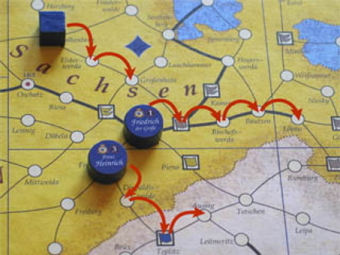 |
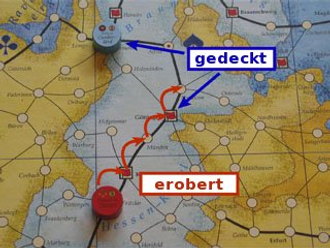 |
|
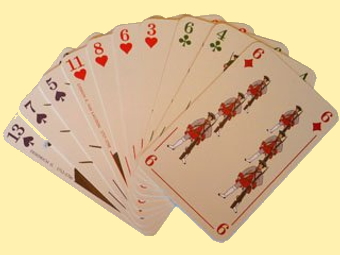 |
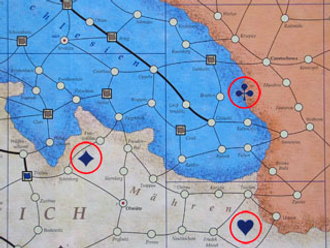 |
|
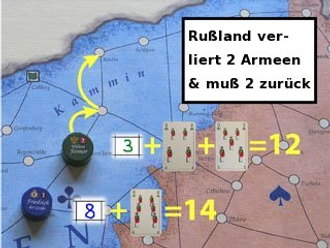 |
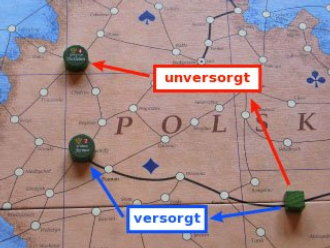 |
|
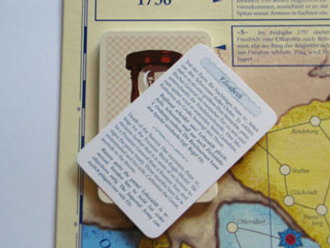 |
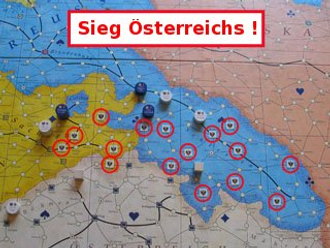 |
|